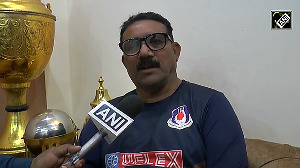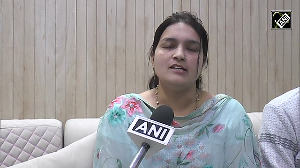
The World Medical Association has called on its members not to implement new International Association of Athletics Federations (IAAF) regulations that restrict testosterone levels in female athletes with differences in sexual development.
The Court of Arbitration for Sport (CAS) this week dismissed an appeal by Olympic 800 metres champion Caster Semenya to set aside the regulations, which will come into effect on Wednesday.
However, the WMA, which represents physicians from 114 national member associations, said there was 'weak evidence' that the regulations were necessary and that they should be scrapped.
"We have strong reservations about the ethical validity of these regulations," WMA President Dr. Leonid Eidelman said in a statement on the organisation’s website.
"They are based on weak evidence from a single study, which is currently being widely debated by the scientific community."
"They are also contrary to a number of key WMA ethical statements and declarations, and as such we are calling for their immediate withdrawal."
Under the rules, female athletes with high natural levels of testosterone wishing to compete in events from 400m to a mile must medically limit that level to under 5 nmol/L, which is double the normal female range of below 2 nmol/L.
The IAAF has said no athlete would be forced to undergo surgery and that oral contraceptives should suffice in allowing them to reach the required level.
Testosterone increases muscle mass, strength and haemoglobin, which affects endurance.
The WMA has previously said the regulations "would constrain the athletes concerned to take unjustified medication, not based on medical need, in order for them to be allowed to compete, and accordingly require physicians to prescribe such medication."
The association added it was unethical for physicians to prescribe treatment to lower testosterone if the condition was not recognised as pathological, and warned of the dangers of "artificially modifying blood constituents, biochemistry or endogenous testosterone".
Semenya will run in the 800m at the IAAF Diamond League meeting in Doha later on Friday, her final event before the regulations come into place.
The 28-year-old, along with Athletics South Africa (ASA), is considering an appeal to the Swiss Federal Tribunal, but after this weekend will have to run with blockers unless she moves up to longer distances.
CAS recognised in their verdict on Wednesday that the regulations were discriminatory, but added they were "necessary, reasonable and proportionate means of achieving the IAAF’s aim of preserving the integrity of female athletics in the Restricted Events".
IAAF President Sebastian Coe reiterated the organisation’s stance on Thursday at a media briefing in Doha.
"It is very straightforward for any association in sport," Coe said. "Athletics has two classifications – it has age and it has gender. We are fiercely protective of both. We are really grateful that CAS has upheld that principle."
Ghosal, Joshna enter squash Asian Championship semis
India's Saurav Ghosal and Joshna Chinappa moved into the semi-finals with convincing victories over their respective opponents in the Asian Squash Championship in Kuala Lumpur on Friday.
Ghosal's was the last match of the day and the Indian hardly broke a sweat as he disposed of Malaysia's sixth seed Mohd Nafizwan Adnan in straight games for an 11-4, 11-4, 11-3 win.
Joshna on the other hand had a task in hand suppressing compatriot Tanvi Khanna before prevailing 12-10, 13-11, 11-7.
Tanvi, who had made impressive strides in the championship and played with lots of motivation, continued in that vein against her senior. Unforced errors undid much of her spirited fight but it must be said to her credit, Tanvi stretched Joshna in the first two games before losing them over tie-break points.
India's campaign ends as Prannoy crashes out of NZ Open
H S Prannoy fought valiantly before losing to fifth seed Kanta Tsuneyama of Japan in the men's singles quarter-final, drawing curtains on India's campaign at the New Zealand Open badminton tournament, in Auckland on Friday.
Unseeded Prannoy squandered a one-game advantage before losing 21-17, 15-21, 14-21 to the World No 11 Japanese shuttler in a marathon last-eight round match which lasted an hour and 13 minutes.
The two shuttlers now enjoy a 1-1 head-to-head record against each other.
The first game witnessed a close fight between Prannoy and Tsuneyama as both matched each other stroke-for-stroke till the first 13 points before the Indian pocketed four straight points to surge ahead 17-13.
The Japanese didn't give up and reduced the gap to 17-18 before Prannoy secured three points on the trot to take the first game.
Prannoy raced to a 4-0 lead in the second game soon before extending it to 11-5.
But then the Indian hit a roadblock and committed unforced errors to give his opponent a leeway and the Tsuneyama grabbed the chance with both hands. He won eight straight points to move ahead 14-11.
The Indian managed to draw level at 14 apiece before Tsuneyama closed out the game at 21-15 in his favour.
The decider too was a hard fought one as both the shuttlers were not in a mood to concede an each. They were tied at 14-14 before the Japanese lifted his game to seal the tie.
Tsuneyama will play third seed and Jakarta Asian Games gold medallist Jonathan Christie in the last-four round.
Olympic great Johnson embarks on stroke education campaign
Champion Olympic sprinter Michael Johnson has minor lingering effects from a stroke, but has made an excellent overall recovery and is urging others to be aware of the symptoms that could indicate they are enduring a similar episode.
Johnson, who has remained physically active since retiring from the track in 2000, had the stroke last September, showing that being physically fit is no guarantee of avoiding the condition.
The 51-year-old American is now partnering with the American Stroke Association on a stroke prevention education campaign.
Doctors credit Johnson's recovery partly to the fact that he sought medical help immediately upon experiencing some discomfort after a "normal" exercise session, though at the time he did not know it was a stroke.
"After that workout I began experiencing a very strange sensation," he said in an interview with Reuters TV.
"I had a weakness in my left leg and a lack of co-ordination and also a tingling and a numbness in my left arm.
"I made the decision to go to the emergency room and not because I was experiencing any discomfort or pain or even knew that I was having a stroke but just out of caution and ultimately that turned out to be the right decision because ultimately I was diagnosed with having a stroke."
A stroke can happen to anyone at any time and occurs when blood flow to an area of the brain is cut off.
"What I've learned since having this is that a stroke can happen to anyone and it happened to me," he said.
Johnson was the star of the 1996 Olympic athletics in Atlanta when he became the first male runner to win the 200 and 400 metres double, the former in world record time.












 © 2025
© 2025